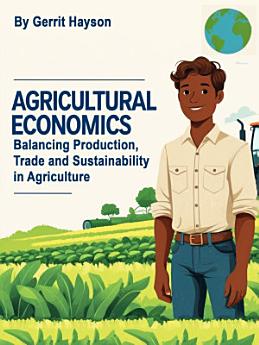Agricultural Economics: Balancing Production, Trade and Sustainability in Agriculture
About this ebook
The economic principles governing agriculture differ significantly from those in other sectors. Unlike manufacturing or services, agricultural production is inherently tied to natural cycles, weather patterns, and biological processes that cannot be easily controlled or accelerated. This creates unique challenges in terms of supply planning, risk management, and market stability. Farmers must make production decisions months or even years before they can harvest and sell their crops, often with limited information about future market conditions or environmental factors that might affect their yields.
Agricultural markets are characterized by their volatility and susceptibility to external shocks. A drought in one region can cause global commodity prices to spike, while a bumper harvest elsewhere might lead to price crashes that threaten farmers' livelihoods. This volatility stems from the relatively inelastic demand for food products – people need to eat regardless of price fluctuations – combined with supply variations due to weather, pests, and diseases. These market dynamics create both opportunities and risks that require sophisticated economic analysis and policy interventions.







